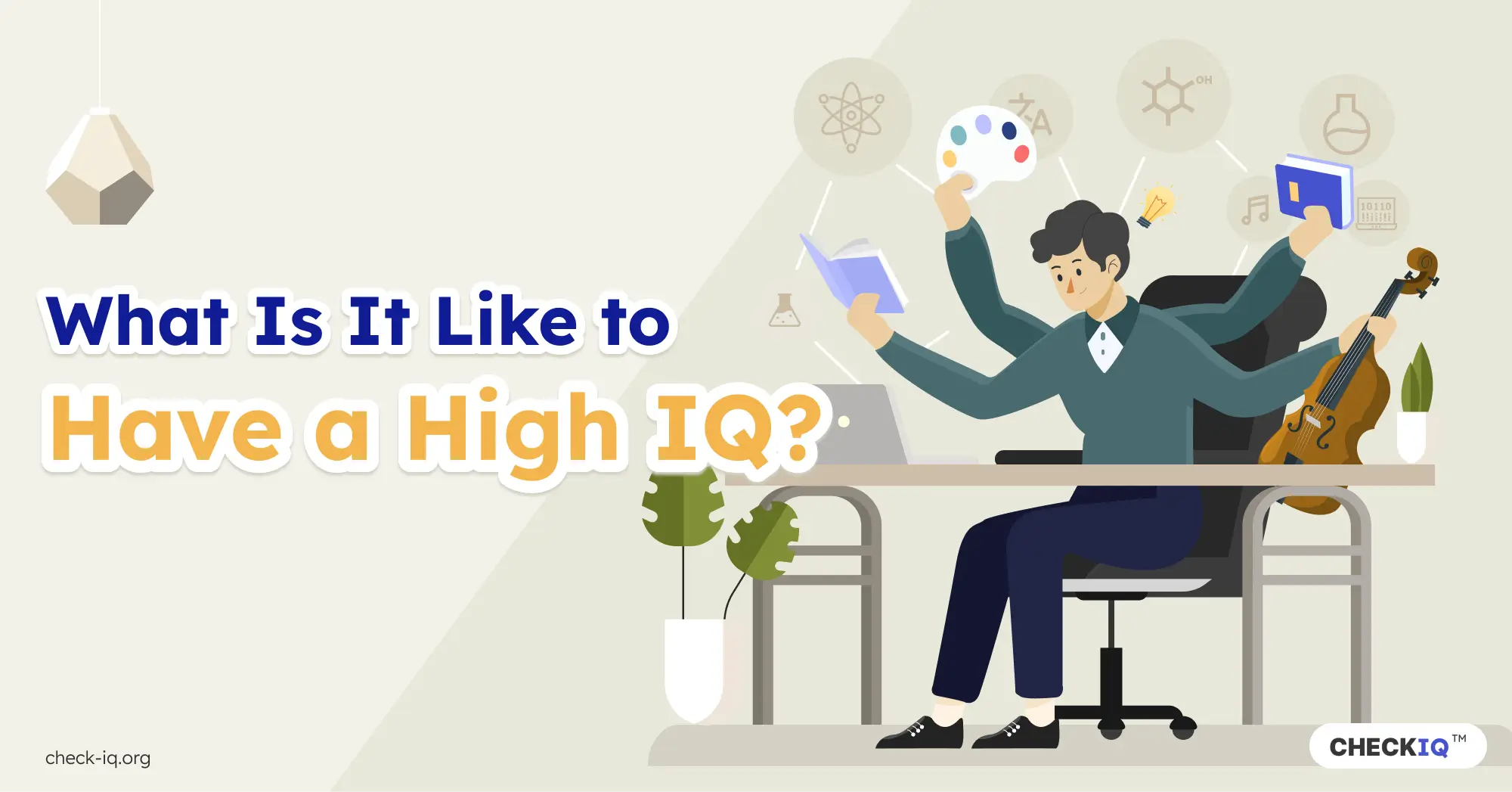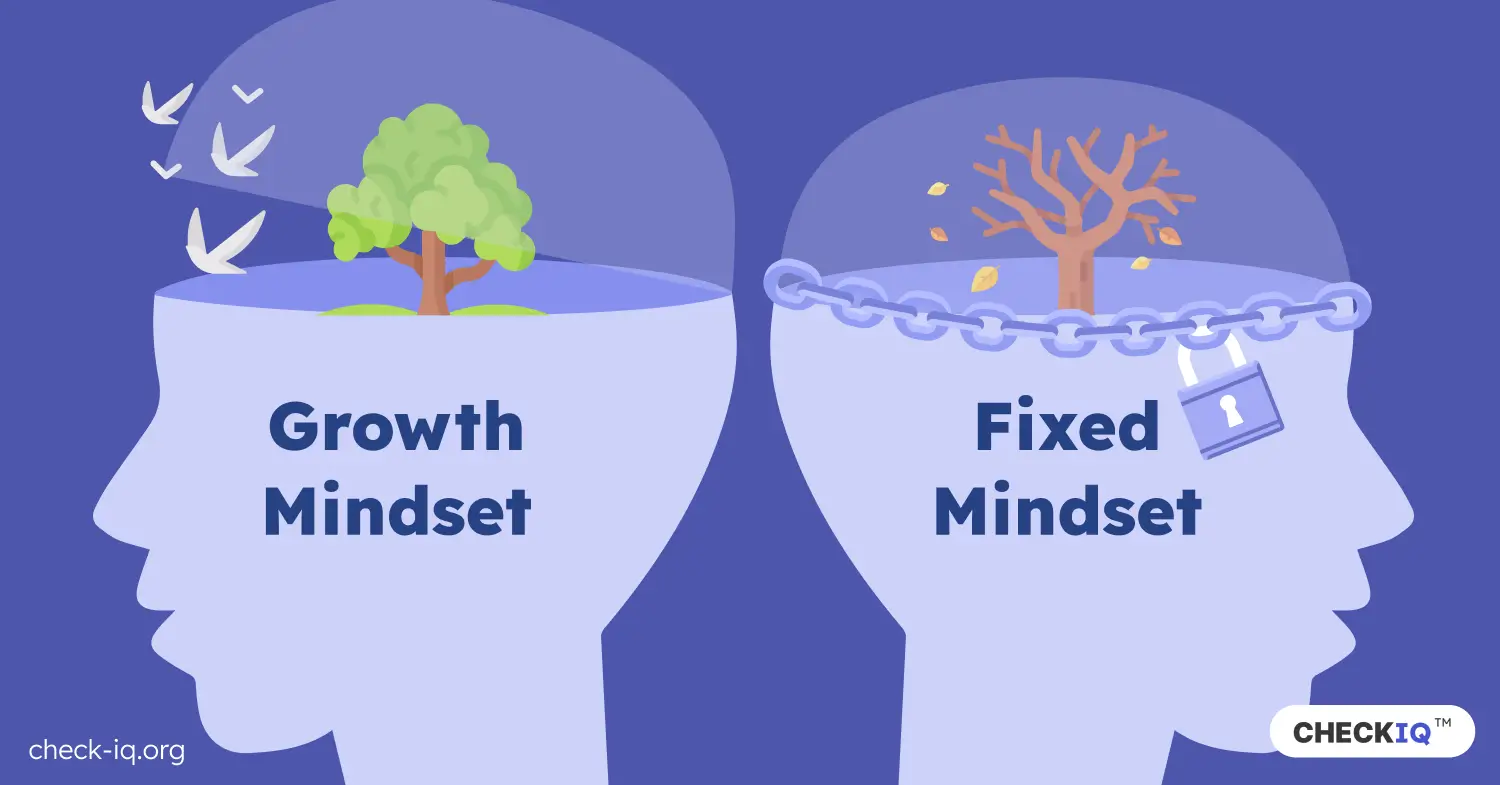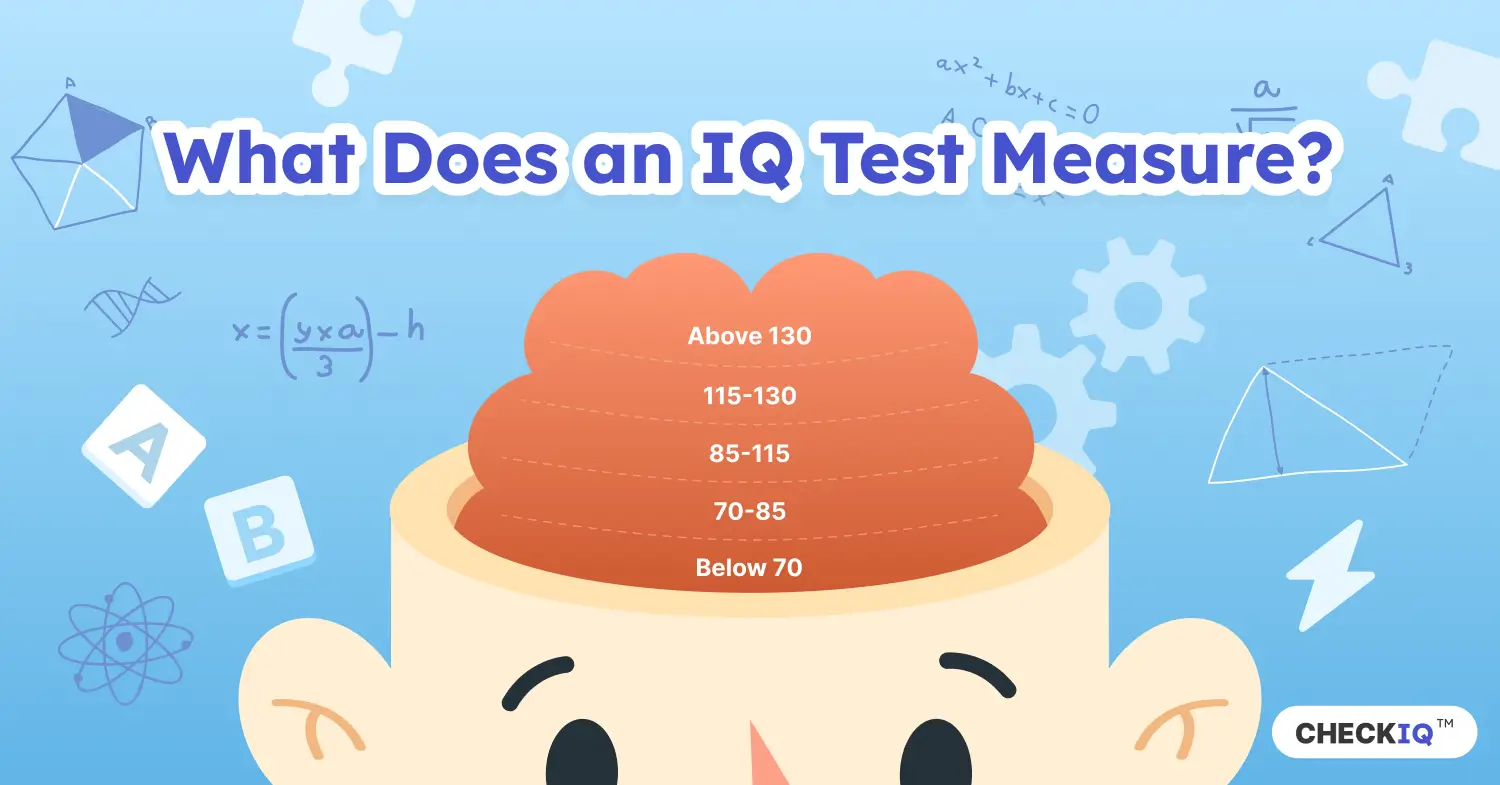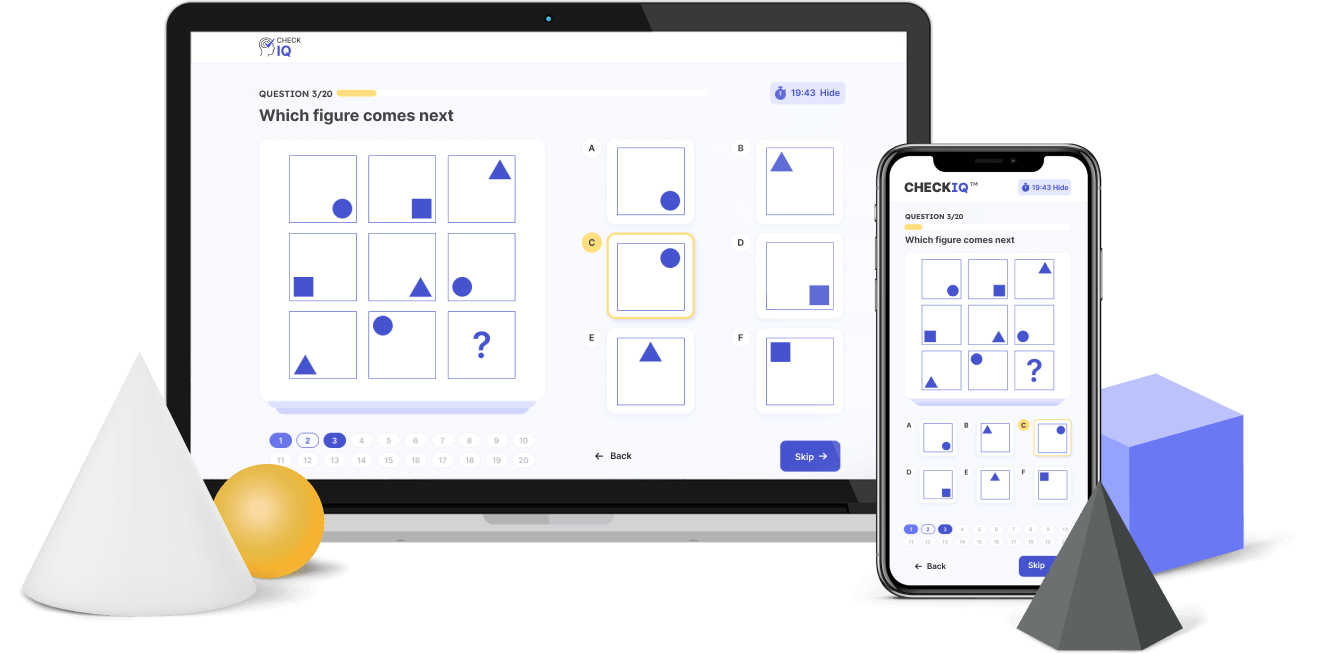Scoring a high IQ is often seen as a ticket to success, opening doors to prestigious careers due to superior mental capacity.
However, IQ is rarely a guarantee for anything besides the set of skills it measures. While it can bring remarkable achievements, its usefulness is limited without other qualities, such as social skills or adaptability.
Let’s dive into what qualifies as a high IQ, the mechanics behind IQ tests, and the unique benefits and struggles faced by highly intelligent individuals:
High IQ Explained
What qualifies as a high IQ?
High IQ typically refers to IQ scores above 130, indicating "superior intelligence." These individuals, eligible for societies like Mensa, possess exceptional cognitive abilities.
However, high IQ isn't just about solving puzzles or excelling in math: it reflects a brain wired for quick thinking, abstract concepts, and rapid information processing. Even so, keep in mind that an IQ score measures cognitive capability, not overall potential or value.
Common IQ tests for adults, such as the Wechsler Adult Intelligence Scale (WAIS) and the Stanford-Binet Intelligence Scales, are designed to evaluate these cognitive capabilities. These tests assess various aspects of intelligence, including reasoning, memory, and language skills.

Among typical signs of high IQ, people with high IQs often show remarkable talents in specific areas. For example, they might have a natural aptitude for learning languages, playing musical instruments, or understanding complex scientific theories. These talents can lead to significant achievements in various fields, from academic research to artistic endeavors.
A reliable 100% adaptive online IQ Test. Get your IQ score immediately.
Start My IQ Test
The limitations of IQ tests
IQ tests assess skills like reasoning, memory, and language. They provide a snapshot of intellectual capacity but don't predict future success or worth. However, there are some disadvantages of IQ tests that should be considered.
The IQ tests challenge different cognitive areas through various exercises, yet they can't capture all mental capabilities. Creativity, practical wisdom, and emotional understanding remain beyond an IQ score. For instance, while a person might score high on an IQ test, they might still struggle with creative problem-solving or empathizing with others.
Even more, IQ test results can be inaccurate for several reasons, such as feeling nervous during the test or the test not accounting for your cultural background. Realizing that IQ tests are only one way to measure intelligence can help reduce unnecessary pressure and anxiety about these scores.
Exploring various forms of intelligence, including emotional and practical intelligence, can provide a more holistic view of one's abilities.
High IQ: Is It a Blessing or a Curse?
High IQ often brings images of geniuses achieving great things. For some, it may even dictate their calling. Someone with a high IQ might excel in fields like science or engineering, for instance, where complex problem-solving is essential.
However, high IQ can also lead to feelings of isolation and a sense of being out of sync with the world, as reported in a Dutch study. This intellectual isolation can create a gap between one's thoughts and societal norms, making high IQ both a strength and a source of frustration.
Here are other potential downsides for highly intelligent people:
- A lack of interest in participating in conversations about everyday topics, as they may find them mundane. This leads to a disconnect with their peers.
- A feeling of being different, which can create social barriers and make it difficult to form close relationships.
- Impatience with tasks or activities that don't challenge them intellectually, which may lead to boredom and disengagement with the world.
High IQ may lead to social and emotional challenges
Contrary to popular belief, making friends isn't always a walk in the park for people with high IQs. For instance, they may have trouble navigating social interactions due to overthinking or find it hard to work in teams due to perfectionism.

Even more, emotional intelligence (also referred to as EQ) might not come naturally to someone with high intelligence. While cognitive and emotional intelligence can coexist, IQ doesn’t guarantee both. Such a person might struggle to empathize with others who don't grasp complex concepts as quickly, leading to frustration on both sides.
Additionally, intelligent individuals might develop a heightened sense of perfectionism, expecting not only themselves, but also others to perform at high standards. This can lead to strained relationships and difficulty in collaborative settings. They might also feel a constant pressure to succeed, driven by both internal and societal perceptions of what they can do.
Resilience against mental health problems
The link between high IQ and mental health is complex. Contrary to stereotypes, recent research from Cambridge University Press indicates that high intelligence may protect against certain mental health disorders like generalized anxiety and PTSD.
This challenges the notion that higher intelligence is a curse, showing that it can offer resilience. Intelligent individuals may navigate their mental landscapes differently, using unique coping mechanisms and perspectives. For example, their problem-solving skills might help them develop effective strategies to manage stress and anxiety. However, the intense focus on intellectual activities can sometimes lead to neglecting physical health or social activities, which are crucial for overall well-being.
Moreover, the internal drive to achieve can sometimes result in burnout, especially if they continuously push themselves without proper rest. Engaging in hobbies, physical activities, and social interactions can provide a balanced lifestyle, enhancing mental health.
How to Live a Better Life With a High IQ
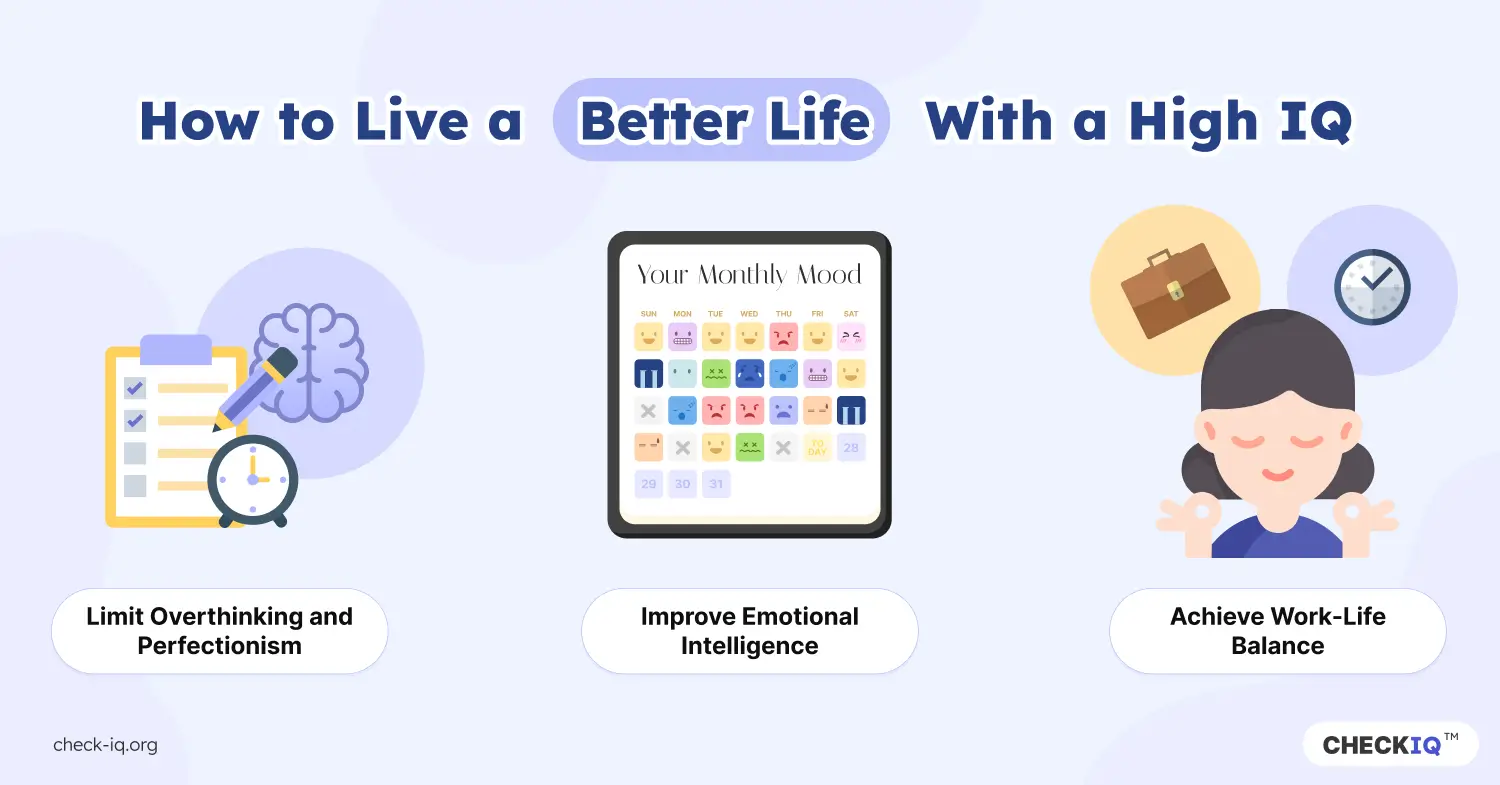
Limit overthinking and perfectionism
High IQ often leads to high self-expectations. Overthinking and perfectionism can create endless loops of doubt.
The first step is to set realistic goals and celebrate small victories. Surround yourself with supportive people who appreciate your intelligence and remind you it's okay to be imperfect. For example, a friend or mentor can provide perspective and help you see the value in your efforts, even when outcomes aren't perfect.
Additionally, practicing mindfulness and relaxation techniques can help manage overthinking and reduce stress. If this isn’t something you’re interested in, though, you can always talk to a psychotherapist about the best ways to cope with such difficulties.
Improve emotional intelligence
According to a 2024 study on emotional intelligence, Emotional Intelligence corresponds to a person's ability to perceive, understand, manage, and reason with emotions. It is often referred to by its measure, Emotional Quotient (EQ). For people with high IQs, boosting EQ can make life more balanced and enjoyable. In many cases, EQ is considered equally as important as IQ, if not more so, for achieving success in personal and professional life.
Here’s what you can do to improve it:
- Start by paying attention to your emotions.
- Keep a journal to track your feelings and recognize patterns.
- Practice active listening to make others feel heard and valued, which can also improve relationships.
- Join social groups or team activities to interact with different people, helping you respond better to various emotional cues.
- Try therapy or coaching.
Developing empathy, clear communication, and listening skills creates a supportive environment, making social interactions smoother and more fulfilling.
This balanced approach helps high IQ individuals use their intelligence in all aspects of life, fostering both personal and professional growth.
Achieve work-life balance
High IQ might help you achieve career excellence, but you may have to pay with your free time.
To avoid this, set clear work hours and prioritize activities that recharge your batteries. Learn to say no to extra responsibilities to maintain balance. Oftentimes, high-IQ individuals already excel at self-regulation, so all you need to maintain your success is the right balance.
You can also create a structured daily routine that includes time for relaxation and recreation to prevent burnout. Incorporating breaks and downtime into your schedule allows for mental rejuvenation, enhancing productivity and overall well-being.
FAQs on High IQ Individuals
There are a lot of preconceptions about high IQ people. We’ve covered some, such as whether rich people have a higher IQ, in other articles, but here is a run down for other ones:
What is the curse of high intelligence?
High IQ can bring social and emotional isolation, along with pressure and high expectations. In his book about “The Curse of High IQ”, author Aaron Clarey discusses how geniuses often overthink and continually pursue success.
The "curse" isn't doom and gloom, but the nuanced challenges of high intelligence. For example, a highly intelligent person might feel pressure to always perform at their best, leading to stress and burnout.
Moreover, the constant pursuit of perfection can result in missed opportunities for relaxation and enjoyment.
Do high-IQ people use more curse words?
Intriguingly, swearing intersects with intelligence. Studies like those from Marist College show that a rich vocabulary of swear words often accompanies a strong overall vocabulary. This suggests that intelligent people use language creatively, including curse words, to express themselves effectively.
The key is understanding the context and appropriateness of language use. Intelligent individuals can use swearing as a form of expression, but knowing when and where to use such language helps you avoid uncomfortable situations.
Can intelligence be a disadvantage?
This may sound counterintuitive, but yes, intelligence can come with a set of disadvantages. Contrary to the assumption that higher IQ always leads to a better life, there are instances where it might actually pose some hurdles.
Intense intellectual abilities can lead to overthinking, decision paralysis, and social difficulties. Intelligent individuals may see layers and implications in issues that others may easily overlook, which, while beneficial in some circumstances, can also make straightforward decisions seem much more difficult to make.

